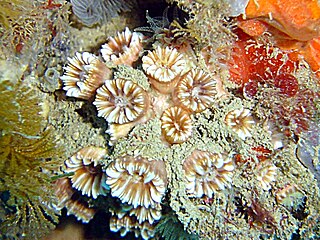
The Caryophylliidae are a family of stony corals found from the tropics to temperate seas, and from shallow to very deep water.

Acanthastrea is a genus of large polyp stony corals in the family Lobophylliidae. The colonies are massive and usually flat. The corallites are either circular or angular in shape. The septa are thick near the wall of the corallite, becoming thin near the columella, and have tall teeth. The polyps are extended only at night.

Bayerotrochus is a genus of sea snails, marine gastropod mollusks in the family Pleurotomariidae.

Favia is a genus of reef-building stony corals in the family Mussidae. Members of the genus are massive or thickly encrusting colonial corals, either dome-shaped or flat, and a few are foliaceous. There is a great diversity of form even among individuals of the same species. The corallites project slightly above the surface of the coral and each has its own wall. In most species, the corallites are plocoid and in some, monocentric. The septa and costae linked to the corallite wall are well developed and covered by fine teeth. The polyps only extend and feed during the night. Each one has a small number of tapering tentacles which often have a darker coloured tip; these are called stinger tentacles, or sweeper tentacles. They use these to sweep the water to see if any other coral is in its area; if so, then they begin to sting the other coral. This is commonly known as coral war. Each coral is trying to make sure it has enough room around it so it can continue to grow and have more surface area for its offspring. The columella is parietal and spongy, and there are vesicles on both the endotheca and exotheca. Members of this genus are widespread in both the Atlantic Ocean and the Indo-Pacific.
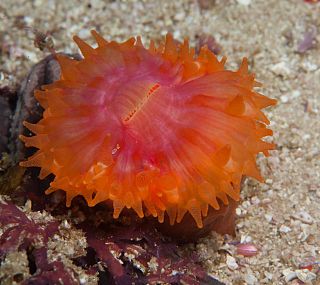
Caryophyllia is a genus of solitary corals in the family Caryophylliidae. Members of this genus are azooxanthellate and are found in the North Atlantic Ocean and the Mediterranean Sea at depths down to 2,670 metres (8,760 ft).

Meandrina is a genus of colonial stony coral in the family Meandrinidae. Corals in this genus form massive hemispherical heads or have large flat plates and can grow to a metre (yard) across. Sometimes it is referred to as.
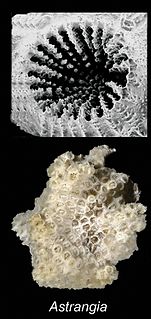
Astrangia is a genus of stony corals in the family Rhizangiidae. Members of this genus are non-reef building corals and are found in the Atlantic and Indo-Pacific Oceans. They are solitary corals with large polyps and are found in clumps. They reproduce from stolons. The corallites are small with simple toothed septa.

Dendrophyllia is a genus of stony cup corals in the family Dendrophylliidae. Members of this genus are found at depths down to about 900 metres (3,000 ft). They are azooxanthellate corals, meaning that they do not contain symbiotic photosynthetic dinoflagellates as do many species of coral.

Schizocyathidae is a family of stony corals. There are currently three genera included in this family and each of them is monotypic. Members of the family are azooxanthellate, deep water species.

Solenosmilia is a genus of small corals in the family Caryophylliidae.

Vaughanella is a genus of small corals in the family Caryophylliidae.
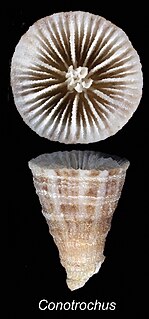
Conotrochus is a genus of small corals in the family Caryophylliidae. It holds four species.

Colangia is a genus of small corals in the family Caryophylliidae.
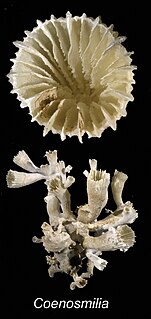
Coenosmilia is a genus of small corals in the family Caryophylliidae.

Dasmosmilia is a genus of small corals in the family Caryophylliidae.
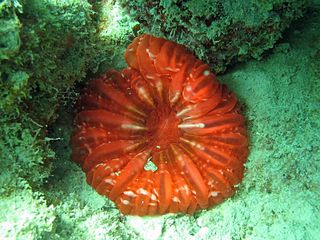
Cynarina is a genus of stony corals in the family Lobophylliidae.

Manicina is a genus of reef-building stony corals in the family Mussidae.
Janaria is a genus of commensal athecate hydroids in the family Hydractiniidae. It is a monotypic genus and the only species is Janaria mirabilis, commonly known as staghorn hydrocoral. It is a colonial species and lives on a shell occupied by a hermit crab. It is native to the tropical and semitropical eastern Pacific Ocean.

Heterocyathus is a genus of coral of the family Caryophylliidae.

Fungiacyathus is a genus of corals belonging to the monotypic family Fungiacyathidae.




















